Throughout Hispanic Heritage Month, ACC asks inspiring and accomplished faculty and staff about their culture, traditions, and accomplishments. Scroll down for additional profiles.
Visit ACC’s 2022 Hispanic Heritage Month website for a list of events happening throughout the month and a message board to share your thoughts.
Sonya Rendon-Rangel
Sonya Rendon-Rangel is the campus coordinator at Elgin Campus. She started at ACC in May 2013 as an administrative assistant III in the Campus Manager’s Office at Elgin.
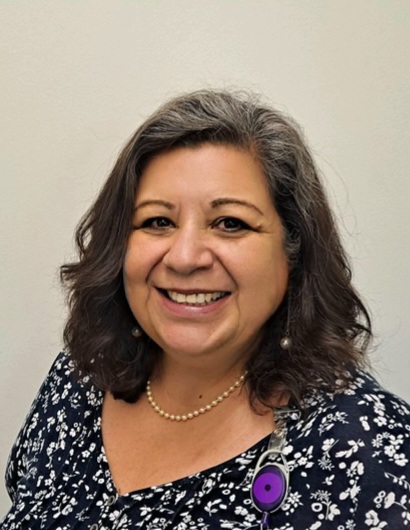
How do you identify with the Hispanic community?
I would describe myself as a proud mestiza whose ancestors are of Indigenous and European descent. We are racially mixed, so I also identify as Latina. I am a second-generation Mexican American. My Dad was in the Air Force in the early part of my life, so we lived in Madrid, Spain, before we came stateside to live in San Antonio, where all of my extended family lives. I learned a lot of beautiful Mexican customs and traditions growing up in San Antonio, where heritage is rich and the population and cultural influences are very diverse.
What is your favorite way to celebrate your heritage?
One of my favorites is attending poetry readings, mostly in Spanish or Spanglish, held by Voces Cosmicas in my hometown. Every year, I attend the play “Las Nuevas Tamaleras” in San Antonio during the Christmas season and other Latino theater events when available. I also attend museum exhibits that showcase Mexican, Latino, and Latin American art and culture. I recently started reading novels in Spanish. While working at ACC, I also have registered for courses that allow me to learn more about my heritage. This semester, I enrolled in a Mexican-American Literature class.
Food and customs are other ways I celebrate — the traditional posadas, tamales, and bueñuelos for Christmas, the 12 grapes for the New Year, Rosca de Reyes (Kings Cake) for Three Kings Day, and I did have the traditional quinceañera.
What advice would you give to our Hispanic/Latinx students?
Be yourself. Growing up, I was always struggling with my identity — not white enough, not brown enough, and not quite fitting in anywhere. You are Latina(o), period. Learn the history, be proud of your culture, and pass on those traditions and customs. You deserve the many opportunities that ACC has out there, so make them your own, reach your goals, and achieve your dreams.
Who or what is your biggest inspiration?
My grandparents and parents are my biggest inspirations. Both of my grandmothers were very influential in my life. I would spend summers at their houses. My paternal grandfather was a Mexican tile artist, and you can see his art at the missions and landmarks around San Antonio like the Menger Hotel. My paternal grandmother was also very artistic and a baker. Her Italian-Mexican influence was evident in everything she created. Both grandmothers knew how to cure you with natural medicines. A pioneer, my maternal grandfather held a position at Kelly Air Force base that was high achieving in that day for a Mexican American.
My parents worked so hard to make sure we succeeded in education and jobs. They are my biggest cheerleaders, only wanting us to accomplish what they could not. My dad double retired from the Air Force Reserve and San Antonio Police Department. My mom is so intelligent and can literally do anything and everything from building shelves to making pottery. She inspired us to read. She attended college in her 50s, showing us it can be done at any age.
What is your proudest achievement?
My family. My husband, son, and I have accomplished so much together with a lot of love, sweat, and tears. We cherish our ancestral traditions and have made new family traditions. Dropping off my son at his university dorm for his freshman year was a big moment for us as parents. Another proud personal achievement is that I went back to school and earned my degree. I continue to work on my higher education and professional goals and feel so fortunate that I am employed with Austin Community College as I achieve these goals.
What do you find fulfilling?
Praying. Spending quiet time with my family. Volunteering in my community. My job, interacting with students daily. Learning more about my culture and putting it into action.
What do you want others to know or understand about your heritage?
We are a very diverse population. Ethnically, we are of European, Indigenous, African, East Asian, Mexican, and Middle Eastern descent — we are mixed, and our culture is rich. Some of us speak Spanish, and some of us don’t. We are much more than what you think you see, and we have a colorful, vibrant, beautiful canopy of history, customs, and traditions we like to share with our friends and family. Reach out!
Lynda Infante Huerta
Lynda Infante Huerta (she/her/ella) is a faculty librarian and assistant professor at the Riverside Campus. She started working at ACC in June 2016 as an hourly academic librarian at Highland Campus before she was promoted to her current position in December 2016.
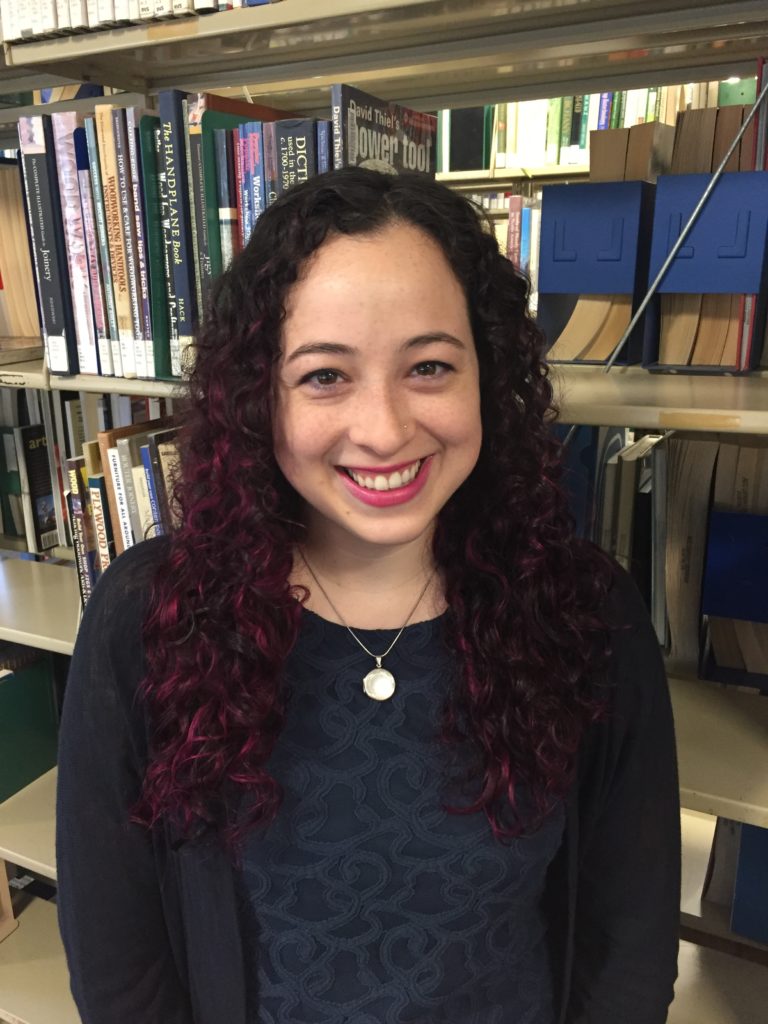
How do you identify with the Hispanic community?
I am from the Rio Grande Valley, a unique stretch of borderlands in south Texas that bridges Mexico and America to make a culture and people completely distinct — ni de aquí, ni de allá (neither here, nor there). My ancestors are from Mexico, and I am a proud 2nd generation Mexican American.
What is your favorite way to celebrate your heritage?
People, traditions, and food. Growing up we had family barbecues on Sundays, holidays, any special occasion. Mexican food is my comfort food, and I love sharing that food with those around me. I also enjoy wearing traditional Mexican dresses. The ones I have are gifts from my mom. They are so vibrant and colorful, and wearing them makes me feel connected to my culture and brings me joy!
What advice would you give to our Hispanic/Latinx students?
There is no wrong way to be you. There are Latinx stereotypes, and if you don’t look or act like that stereotype it’s easy to feel like you’re not Hispanic/Latinx enough. Whether you speak Spanish or not, have an accent or not, no matter how you look, you are Latinx enough.
Who or what is your biggest inspiration?
Definitely my parents. My mom had 10 siblings and was a migrant worker, so she would travel up north to work in the fields half of the year. She was the first in her family to go to college and graduate. She was brave and had such perseverance since she did not know how to nativage the system but worked really hard to get her degree. I would not have had the opportunities I had growing up without my parents’ example. They both taught me to believe in myself.I never questioned that I would go to college, because they paved the way for me.
What is your proudest achievement?
Before I was a faculty librarian here at ACC, I was a clinical microbiologist. While there were many aspects of that job I loved, I knew I needed a change. I decided to get my graduate degree in library science while I worked full time as a microbiologist. It is very hard to work full time and still have the energy to pour into school, and it was scary to think about such a big career change. I am proud that I was able to get my graduate degree, and then take the leap into an entirely new career as a librarian. I feel like my role as a librarian is so much more fulfilling, and I love being able to support the ACC community with my work.
What do you find fulfilling?
I love to spend time with old friends. I am still very close with many of my childhood friends, and even though I am five hours away from my family, quality time with my friends really brings me peace and contentment. They feel like a little slice of home here in Central Texas. Sometimes in my day-to-day life, I am not around a lot of other Latinx people, and I have found I need time with my people to stay connected and rooted in that aspect of my identity. I am my best self when I can bring my full identity as a Latina to all that I do, and I value time with my close friends that give me the encouragement to do that.
What do you want others to know or understand about your heritage?
We are so much more than our stereotypes. Most people are familiar with Mexican food, or Cinco de Mayo, but for those outside of the Latinx community that might be all that they know. I want others to take the time to ask questions, learn about our strong communities, heroes, and traditions. I also want others to know that we need representation! We are so underrepresented in two of the areas that I love most, literature and film. Read books by Latinx authors, support Latinx shows — help amplify our voices so we can tell our stories so others can see how rich and valuable our perspectives are. We are more than food and costumes and drinking holidays.
Dr. Alberto Quinonez
Dr. Alberto Quinonez is department chair and professor of ACC’s Engineering Technology Program. He started working at ACC in spring 1999.
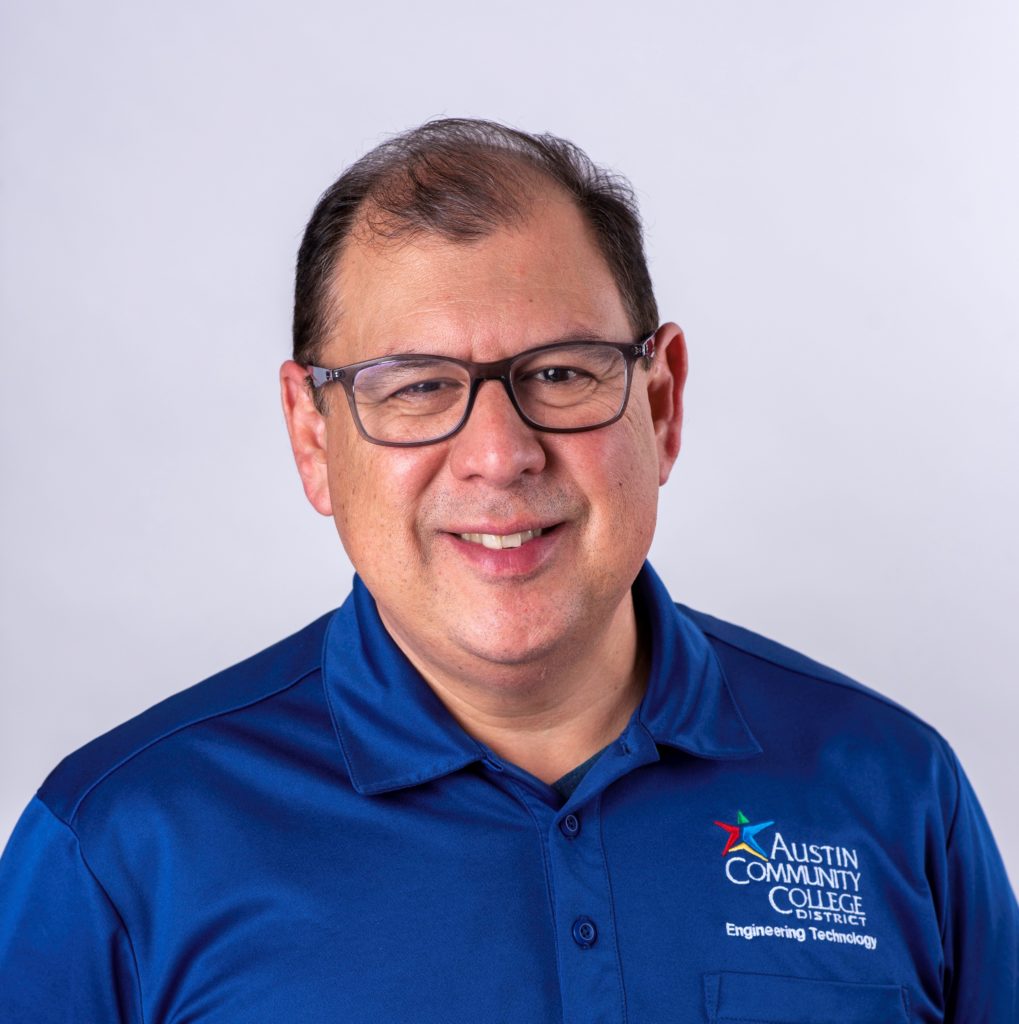
How do you identify with the Hispanic community?
I am of Mexican descent. My siblings and I were born in Del Rio, Texas, which borders Ciudad Acuňa, Coahuila, Mexico. My brother, sisters, and I grew up in two worlds simultaneously. During those times, those two worlds were blended. We had family in both Del Rio and Acuna. Sundays were always fun. We would visit our abuelitos, tias, tios, and primos on both sides of the border. It was always a treat to cross over to Mexico to visit family, stroll the plaza, market, and numerous curious shops that lined the vibrant streets. The sounds, smells, food, and socializing was amazing. Switching between speaking Spanish and English was second nature to us. We did it often and with ease. I feel blessed to have been raised in a predominantly Mexican American community to experience the diversity of cultures on both sides of the border.
What is your favorite way to celebrate your heritage?
This is a difficult question for me to answer; I grew up on the border and every day was essentially Hispanic Heritage Day. I never thought that I would be celebrating a special holiday or event to commemorate my heritage. In my life, whenever I have celebrated or participated in an event that is tied to Hispanic culture, I did it because it is part of my existential being and not because I intentionally wanted to pay homage to my heritage. Essentially, I celebrate my heritage by just simply being who I am and living my life.
What advice would you give to our Hispanic/Latinx students?
I find it interesting that there are so many nomenclatures that attempt to describe us, e.g. Latinos, Latinx, Hispanic, Criollo, etc. If you’re of Mexican descent, like me, you may have heard terms such as Mexican American, Tejanos, Californios, Chicanos, etc. Then there is the whole Hispanic-White and Hispanic Non-White thing. With all these different names and categories it is no wonder that sometimes I feel like we have an identity crisis on our hands! I jest, but in reality, it should not be a surprise that categorizing us is not so easy. With regard to human history, Latin people and Hispanics from South America and the Caribbean are the newest people in the world. As everyone knows, we are a result of the fusion of the old world and the new world, which happened only about 500 years ago. We are the new kids on the block.
My advice to young and relatively young Hispanic students is this: Be proud of who you are and be yourself. Know that you are part of one of the fastest-growing communities in the U.S. However, population numbers won’t mean much if we continue to be at the lowest end of the educational and socio-economic spectrum. Hence, you need to get your degree — the more education, the better. Do not let anything deter you from reaching your goals. Get a mentor in your life. If you do not have a mentor, find one. How do you know who to select as your mentor? Find those people in your life who have your best interest at heart. Those are the people you need to recruit as mentors. At the same time, stay away from people who do not have your best interests in mind.
Never be afraid to ask for help. There are a lot of people at ACC who will help you so long as you reach out to them. Never be a victim. Take ownership and agency over your life. Make the best choices you can. Always do the work that you need to do. Do it to the best of your ability, and do it on time. Do not get behind and never give up. When you feel you are hitting a wall, stop and ask for help. If you can vote, then vote. Always vote. Only by voting will we make a difference. Lastly, try to stay away from student loans if you can. Try not to get into debt.
Who or what is your biggest inspiration?
I have had the pleasure of working with and meeting all sorts of people over the years. I have met so many accomplished Hispanics in both education, industry, business, and government. I am always inspired when I see other Hispanics who have reached high levels of success. I remember feeling very proud when former president Barack Obama appointed the first Hispanic Supreme Court Justice, Sonia Sotomayor. Another rising star in politics who inspires me is Alexandria Ocasio-Cortez. I think it is important to support fellow Hispanics in their strive toward success in whatever capacity possible. That is how we are going to pull ourselves up — by sticking together and helping one another succeed.
What is your proudest achievement?
Obviously, completing my higher education degrees is something very fulfilling to me. My father only had a second grade education from Mexico. My mom was forced to drop out of high school in order to work and help support the family. My siblings and I really looked up to our mother, even though she was only 4’ 11” tall. She was my inspiration. A hard-working, devoted mother who was highly intelligent. I remember that she was excellent at math. She always believed in me and supported my ambitions of going to college. I am proud to say that my sisters have their college degrees as well. Now, I am thrilled to see my nephews and nieces attending and graduating with college degrees — this makes me prouder than anything else.
What do you find fulfilling?
Teaching, itself, is a rewarding and fulfilling endeavor. I get a thrill when I visit a business and take a tour of their operation. To my surprise, I run into former graduates of our program. It is very fulfilling to see that what we do really makes a difference in the lives of many. Our graduates are able to get good-paying jobs that support them and their families. Moreover, they have the opportunity to move up in their career and continue in their studies if they wish.
I have also enjoyed the environment and camaraderie at ACC. I get to work with some of the most amazing people. I truly believe that the faculty at ACC are first rate and that they care deeply about their students. The staff is amazing as well — at every level and at every office you find people who are talented, friendly, and eager to help students succeed. I am so proud to be a part of the Riverbat community.
What do you want others to know or understand about your heritage?
I would like others to know that the Hispanic community in the U.S. is a very large, complex, and diverse community. Oftentimes, I feel that some people or agencies try to put us all in the same bucket. I do understand that classifications are necessary for such things as polling, demographics, and political discourse. However, I wonder if non-Hispanic people realize how diverse and distinct we really are. Hence, I think it is important that people take the time to know each other better. In particular, we should make an effort to find out a little bit more about the people around us that are respectively different from ourselves. This is something that has helped me in my personal and professional life. Before coming to ACC, I was a field process engineer in the semiconductor industry. I had the opportunity to travel and work at different facilities in and outside the U.S. I really enjoyed my time working in Taiwan and France. It is really eye opening to learn about other cultures. At least for me, I realized that people are more alike than they are different. Getting to know people who are different from ourselves gives us a fresh perspective about the world, and I believe this can help us develop a better sense of respect and understanding of one another.
Dr. Carleen Sanchez
Carleen Sanchez, PhD, is the department chair for Anthropology, Economics, and Geography Professor of Anthropology. She started working at ACC in August 2011.
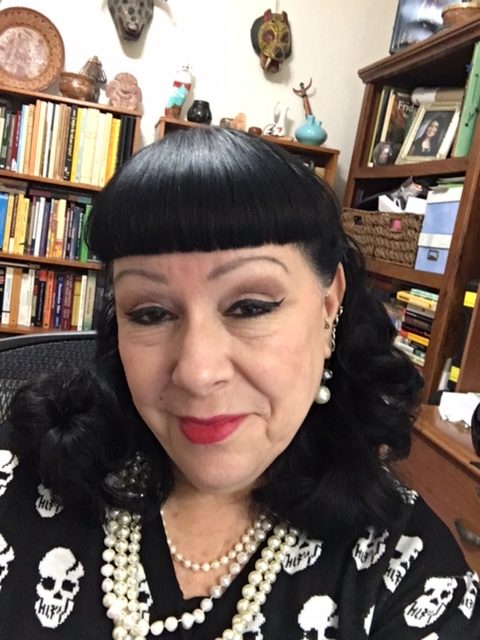
How do you identify with the Hispanic community?
I identify as Chicana – a Mexican American woman born and raised in the United States. The history and experiences of Chicana and Mexican American people have been of loss (e.g., language, traditions, land, and rights), poverty, marginalization, and limitations. However, Mexican Americans have persisted and flourished through education, art, music, politics, and service to the U.S.
I also identify as Latina/e/o/x – as a member of the larger community of peoples of Latin-American background. We share so much! But of course, each of our cultures is distinct and rich. My daughter is half Salvadoran and she identifies as Salvadoran American. Through the comingling of different elements of her father’s and mother’s cultures, she experiences being Latinx differently than I do. But, we have so much fun engaging each other in memories and our shared traditions.
What is your favorite way to celebrate your heritage?
Through family, language, and traditions. Family is so important to me. I revere my parents and ancestors for the strength they have handed down to me. Some small ways that we celebrate being Southwestern Mexican Americans are by remembering our ancestors, telling stories and histories, and appreciating the icons and images of the Southwest that mix Spanish/Indigenous beliefs that have melded over the past 400 years.
Of course, food is another great way to appreciate being Latinx! My daughter (she lives in London, England) often complains that people there think that all frijoles (beans) are the same in the various Hispanic cultures. In Southwestern Mexican American food traditions, the pinto bean is the staple. But in Guatemala, black beans are more popular. Small red “silk” beans are the preferred frijole in El Salvador. Our indigenous ancestors domesticated beans and created many varieties that are found in different regions of the Americas. This humble food, along with maize (corn) serves as the foundation of so many of our food traditions.
What advice would you give to our Hispanic/Latinx students?
Persist! Although we each encounter difficulties and obstacles in life, it is possible to find workarounds, dig our way through problems, and even forge new paths around obstacles as we pursue fulfilling lives as thoughtful, civic-minded, and giving individuals of our Hispanic/Latinx communities.
Be who you are! Take pride in your ancestry, traditions, and culture. Remember that you have much to offer the world, our nation, state, and communities. Hispanic and Latinx people have contributed much to our society, and you are needed for coming generations.
Who or what is your biggest inspiration?
My parents. They worked very hard to leave behind the poverty and limitations of small-town Colorado where Mexican Americans were subject to regular discrimination. Through much hard work and sacrifice my parents provided the conditions for my sister and I to thrive socially, academically, and ethically.
My dad served in the Air Force (during the Vietnam War) to gain the V.A. benefits that would get him through college. My mom worked out of the home to support the family economically, but she missed the opportunity for higher education. Both parents encouraged their daughters to excel in school, go to college, and become professional and independent women. Today, I have a Ph.D., and my sister is an attorney.
What is your proudest achievement?
My personal greatest achievement was earning my doctorate from the University of California, Santa Barbara. Growing up, and even as an undergraduate college student, I did not anticipate becoming a college professor. My profession has given me so much, including the opportunity to make a difference in students’ lives.
What do you find fulfilling?
Teaching is my profession and avocation. I find my work so important and rewarding. All faculty at ACC are engaged in one of the most important jobs of the nation – helping students learn about the world around us and figuring out our place in that world.
What do you want others to know or understand about your heritage?
Remember, the terms “Hispanic” and “Latinx” are umbrella terms that incorporate many different cultures, regions, and traditions. Mexican Americans are distinct from Puerto Ricans, Nicaraguans, or Peruvians. Each culture is rich and beautiful and needs to be respected and appreciated. But, we also share a great deal and find strength in unity as Hispanic and Latinx people in the United States.
Dr. Richard Ray Espinosa
Dr. Richard Ray Espinosa is ACC’s department chair for Allied Health Sciences, Pre-Health Sciences, and Pre-Med. He is also a professor for the Allied Health Sciences Department and adjunct faculty for the Pharmacy Technician Program. He started his teaching career at ACC in the summer of 1994 with a class in Pharmacology.
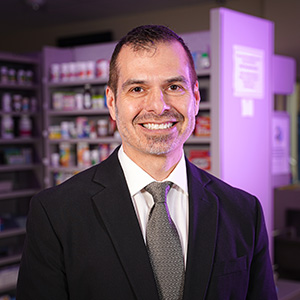
How do you identify with the Hispanic community?
I am proud of my culture and want to keep it alive here at Austin Community College. Speaking Spanish is one way I connect with the Hispanic community. Being born into a Hispanic family, we had many Mexican-American traditions. In the Latin American culture, most girls turning 15 years old have a quinceanera, or quince, to celebrate their transition from childhood to adulthood. Since my parents did not have any girls, they asked if I wanted to have a “quinceanero,” and I said yes. A quince typically involves a mass followed by a party with a band and dance. I had all of that and a full court of teens with me to celebrate. I still remember my quince like it was yesterday. It was something I am glad I had to identify with the Hispanic community in my small town of Beeville, Texas.
What is your favorite way to celebrate your heritage?
I celebrate my heritage by continuing the family traditions that I grew up with. One of the things that I enjoyed as a kid was the food we ate around the holidays — tamales on Christmas Eve; Pan de Polvo on Christmas for dessert; and buñuelos (crispy cinnamon tortillas), a dozen grapes, and black eye peas for New Year’s. Those are foods I continue to enjoy that bring me back to my roots. Carrying family traditions to the next generation is important. Because my triplet children were in the midst of the pandemic during their 15th birthdays, we decided to celebrate “a quince + 1” the next year for their 16th birthdays. We had Mexican food and mariachis to celebrate with my children, their friends, and family.
What advice would you give to our Hispanic/Latinx students?
While it may be hard at times to get through college, and you may not feel like you belong, keep believing in yourself and know you belong just as much as the person next to you. Look for Hispanic/Latinx role models on campus, including other student leaders, professors, staff members, or counselors who look like you. You’ve got what it takes to be the best product of yourself, and ACC will help you get to that goal.
Who or what is your biggest inspiration?
My family is one of my biggest inspirations. My parents introduced me to cultural Hispanic traditions and went through a lot to help me achieve my goals. This inspired me to have a family of my own. I hope to come as close as my parents did with helping my kids succeed in life as well. We are all uniquely different, and in a good diverse community, we can respect each others’ viewpoints.
What is your proudest achievement?
My proudest achievement at ACC was when I was recognized by the national Quality Matters (QM) organization for making a difference in students’ achievement. Receiving this award allowed me to know that our students were receiving the best quality online courses and that we were practicing equity, inclusion, accessibility, and diversity. By having all of our online department courses peer-reviewed by a committee to become nationally QM certified, it promotes engagement, retention, satisfaction, and achievement for all of our students.
What do you find fulfilling?
I have had several students over the years come up to me toward the middle of the semester to ask if I am Hispanic. When I tell them I am, they begin to smile and feel able to relate to me better because I know where they came from. Occasionally, I will use my Spanish in the classroom in phrases or one-word comments, and the Hispanic students’ heads perk up, and they begin to feel more connected with me not only as their professor, but on a personal level as well. They want to hear my stories of how I got to where I am today so they can get there, too.
What do you want others to know or understand about your heritage?
Remember where you come from, focus on the strengths that you bring to the table with your heritage, and use that to help get your goals accomplished. Everyone is unique. Use your assets to explore what you are good at, and do not be afraid to share that with your community. Get to know other cultures as well — see how they are similar and how they are different, and respect that we are all one in this big picture in the end.
More interviews coming soon.

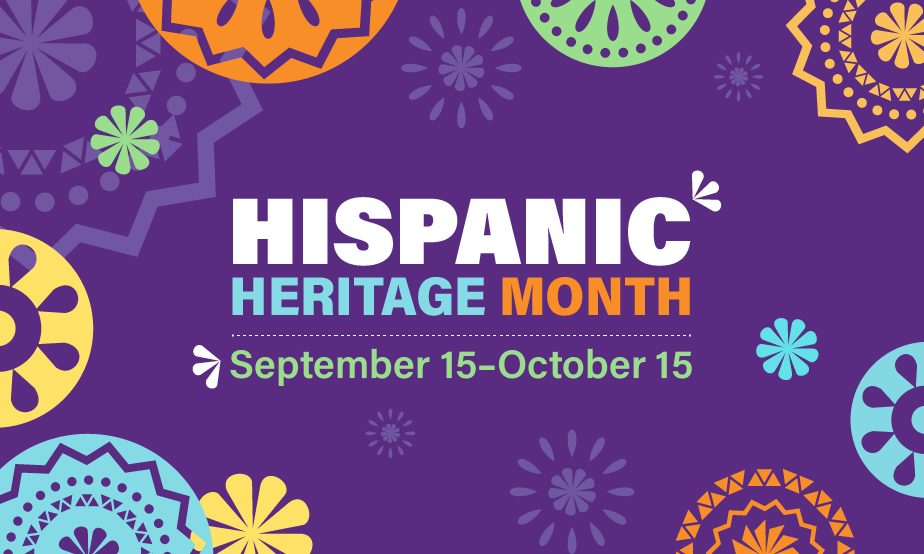
What a great article of our heritage and our town.